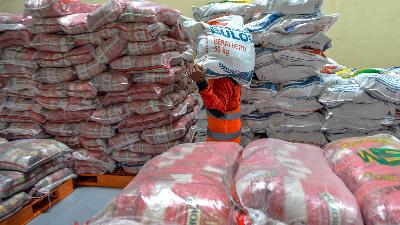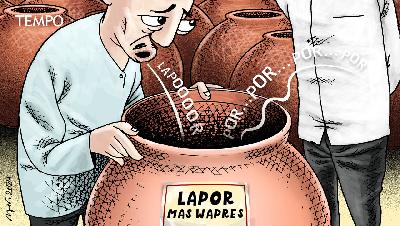A New Plan for the Food Sector
Monday, November 25, 2024
The Agriculture Ministry is to take over the control of food institutions and state-owned enterprises. This risks worsening the management of the food sector.
arsip tempo : 174490793843.

THE Red and White Cabinet has only been working for a month, but indications that, like its predecessor, the administration of President Prabowo Subianto is failing to manage strategic national issues are already apparent. The agriculture and food sectors could be its first victim.
The government is discussing changes to a number of regulations concerning the management of agriculture and food non-ministerial institutions and state-owned enterprises (SOEs). The position of the National Food Agency and the Indonesian Quarantine Agency, which are currently directly responsible to the president, will be moved under the authority of the Agriculture Ministry. Meanwhile, the authority of the Agriculture Ministry will be extended with the additional responsibility of overseeing and developing fertilizer company Pupuk Indonesia, distribution and trade company Rajawali Nusantara Indonesia, plantation company Perkebunan Nusantara, the State Logistics Agency (Bulog), and the State Forestry Company (Perhutani)—a role currently held by the SOEs Ministry.
Agriculture Minister Amran Sulaiman claims that the endeavor to accelerate the achievement of food self-sufficiency requires coordinated policies. In his letter to Prabowo dated October 24, Amran referred to “a sole command for agriculture from top to bottom.” This proposal was accompanied by a draft text for changing regulations that underlines the importance of integrated management of food and agriculture as a way of mitigating the global food crisis.
The threat of a global food crisis is serious. According to a report published by the World Food Program in April, in 2023, 281.6 million people around the world are in a state of acute food insecurity, a twofold rise compared with the figure five years earlier. Climate change and the geopolitical situation have caused economic problems, including to the global food supply chain, resulting in an increase in the number of regions facing the threat of a food crisis to 59 countries. Although Indonesia is not on this list of nations, it could still feel the impact.
The government must formulate an integrated food policy to anticipate this. The management of the agriculture and food sectors has long been in disarray. Low quality data and poor coordination between institutions have led to chaos in government policy, from planning to realization. The food estate projects in Central Kalimantan and North Sumatra during the area of President Jokowi are one example of this.
But putting the Agriculture Minister in control of food institutions and state-owned enterprises is clearly a mistake. Instead of being a solution, this move could give rise to new problems. Prabowo must put a halt to this plan.
Prabowo should order Minister Amran to focus on putting right a number of problems in the Agriculture Ministry. The report of an audit carried out by the Supreme Audit Agency published in September contains details of poor performance by the Agriculture Ministry in its programs to ensure food availability and affordability from 2021 to the first half of 2023. The management of the ministry’s budget for expenditure of goods, capital expenditure, and current asset balance also had a large number of flaws because they were not supported by evidence of responsibility and were not in line with regulations.
With such a poor report, it is impossible to imagine how the Agriculture Ministry will be able to carry out its new responsibilities, especially controlling food related SOEs. There is a risk that these SOEs will have to bear the burden of the ambitious project to establish rice fields that was planned by Prabowo and Amran long ago. Looking at previous experiences, when the government has asked SOEs to work on infrastructure projects, it has led to major losses to the companies and to state budget. It would be very unfortunate if the agriculture and food sectors were the next target.











